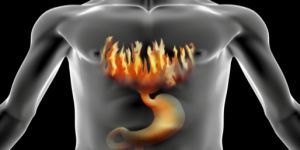Article
Tips to Avoid GERD Symptoms for Holiday Meals
Author(s):
This holiday season, giant holiday meals will be the source of painful symptoms-such as heartburn-for the 45 million Americans living with acid reflux, including many who suffer from gastroesophageal reflux disease (GERD). Doctors across the nation, however, are striving to aid these sufferers by conveying some tips on how to avoid acid reflux issues this season.

This holiday season, giant holiday meals will be the source of painful symptoms—such as heartburn—for the 45 million Americans living with acid reflux, including many who suffer from gastroesophageal reflux disease (GERD). Doctors across the nation, however, are striving to aid these sufferers by conveying some tips on how to avoid acid reflux issues this season.
Symptoms of acid reflux are painful enough, but for GERD sufferers, eating a large holiday meal can be less enjoyable thanks to the possible consequences of abdominal pain, nausea, coughing, and compulsive throat clearing. GERD expert Dr. Robynne Chutkan, spokesperson for the American Society for Gastrointestinal Endoscopy and an assistant professor at Georgetown Hospital in Washington, DC, offered these three helpful holiday meal hints.
Eat earlier
According to Chutkan, eating a large holiday dinner in the afternoon instead of the evening can do wonders for the digestive system of a GERD sufferer; Chutkan explained that this is because the stomach and intestines are much less active at night, therefore slowing down digestion. When the stomach is working overtime in the holiday season, the slowing down of digestion can easily lead to acid reflux symptoms.
“The stomach is quite small in terms of what it can hold. So if you eat too much, and the stomach doesn't have time to empty down into the small intestine, acid is going to come back up into the esophagus,” Chutkan reported.
Avoid trigger foods
As all acid reflux suffers know, certain types of food and drinks are especially dangerous to eat when trying to avoid heartburn and other agonizing symptoms. Unfortunately, the foods that are the worst acid reflux triggers are also bound to be on the menu for all holiday meals. High calorie dishes served beside alcohol, chocolate, and caffeine are practically guaranteed to show up on every American dinner table this year.
Even the healthiest eaters will probably find that all vegetables and fruits will be drenched in butter or fatty sauces. Chutkan advised patients to avoid these foods, but as it can be very difficult for individuals with acid reflux to avoid their triggers altogether at a holiday feast, she continued to say that consuming fewer calories will help decrease the chance of suffering from symptoms after eating.
Move around after the meal
Everyone knows what happens after a heavy and filling holiday meal—nap time. But chances are, if an acid reflux sufferer sits around after eating, heartburn is imminent.
“Because you're sitting there with a big full stomach, one of the most helpful thing to do is go for a walk after you eat, to keep things active so that the stomach can empty better,” Chutkan said.
If it’s simply not possible to go for a walk or move around, though, sitting upright instead of laying down can also keep symptoms at bay, as gravity will assist the digestive system by pulling food through the stomach.
If all else fails, antacids are always an option if other medications are not already being used to control acid reflux. Simple changes in behavior, however, are probably the best bet to avoid uncomfortable symptoms altogether and should be attempted first.
“There's ways to celebrate without eating a huge, heavy meal,” Chutkan continued. “There's things like breaking up your meal, eating a few appetizers and hors d'oeuvres, then eat a bit of a main course later. Give your stomach a while to digest. Go out for a walk in nature, and then come back and have your meals.”





